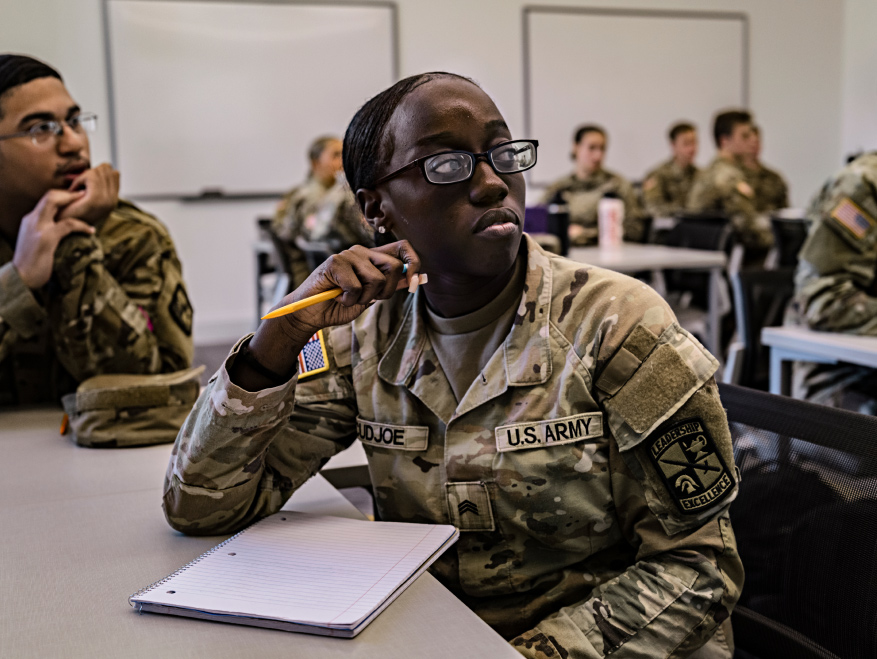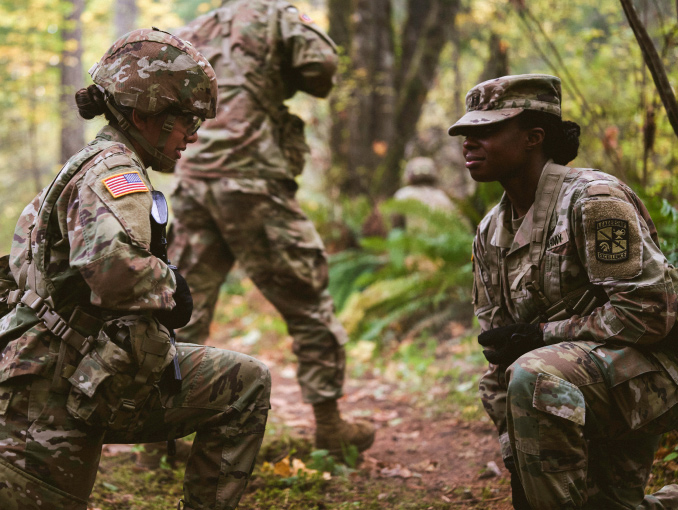Army ROTC
Get an education in leadership.
Become an Army leader through Reserve Officers’ Training Corps (ROTC), which teaches valuable skills and covers your college education.

Take charge
Take charge
of your
of your
future.
future.
Graduate as an Army Officer.
Find schools with ROTC programs.
Army ROTC pays for your tuition while you go to college and train to become an Army Officer. It’s offered at more than 1,000 colleges and universities. Get the college experience and graduate as a second lieutenant in the Army, Army Reserve, or Army National Guard.
Earn scholarships and financial help.
High school students who apply for ROTC are eligible for scholarships covering up to the full cost of tuition based on merit and grades, plus $420 per month for personal expenses and $1,200 per year for books.
Start ROTC at any stage of college.
Freshman or Sophomore
Basic Course
You’ll learn basic Army skills and what it takes to become a leader. The Basic Course normally involves one elective class and lab each semester, along with the required physical training and field training exercises.
Sophomore or Transfer
Basic Camp
You’ll practice becoming a leader in a team setting while getting helpful feedback to grow. Basic Camp is a 32-day intensive training event and accelerated alternative to the Basic Course that qualifies you for enrollment in the Advanced Course.
Junior or Senior
Advanced Course
You’ll learn advanced military strategies in a classroom setting and practice teamwork in preparation for Advanced Camp. Advanced Course requires completion of the Basic Course or Basic Camp and establishes your commitment to serve as an Army Officer after graduation.
Junior or Senior
Advanced Camp
You’ll be trained and tested through leadership development exercises in real-world scenarios. Advanced Camp is a 35-day rigorous field training event during the summer—and the most significant in your ROTC journey—which you must pass to qualify as an Army Officer.
Enlisted to Officer program
If you’re an enlisted Soldier in the Army with education and leadership goals, you can become a commissioned Officer through the Green to Gold program. Attend a college offering an ROTC program and even get a scholarship for your degree.

Take the first step.
Find out more about becoming a Soldier and if a career in the Army is right for you.
Common questions about Army ROTC.
Not finding what you need?
Chat with us any time.
If I enroll in Army ROTC, what is my future service obligation?
If I enroll in Army ROTC, what is my future service obligation?
Enrolling in the ROTC Basic Course (the first two years of college) does not obligate you to serve unless you receive a scholarship. If you received a four-year ROTC scholarship, you must agree to serve four years full-time as an Army Officer after you graduate and then either extend your contract for four more years or serve four more years with the Individual Ready Reserve (IRR) where you’ll return to civilian life but need to be ready to help in a national emergency. If you received ROTC scholarships, you will potentially have a four-year full-time or eight-year part-time employment contract.
What makes Army ROTC different?
What makes Army ROTC different?
The Army has a wide range of careers in more places around the world than any other U.S. military branch. Army ROTC offers mentorship, shadowing opportunities, and real-world leadership training while still having the full college experience.
Army Officer salaries are generally comparable with mid- to senior-level corporate executives. However, when you consider additional benefits like free health care for full-time Soldiers, as well as allowances for housing and food, opportunities to get an advanced degree without incurring debt, 30 days paid leave every year, and more financial benefits, the Army is more competitive than similar civilian careers. Take a look at these pay tables to see current salaries.
Can I still choose my college major?
Can I still choose my college major?
Yes, you can choose any college major you wish and still commission as an Officer through ROTC when you graduate.
What are Army ROTC courses like?
What are Army ROTC courses like?
In college, Army ROTC classes normally involve one elective class and one lab per semester. Although the classes involve hands-on fieldwork as well as classroom work, they are standard college classes that fit into a normal academic schedule.
If I’m in Army ROTC, do I still have to attend Basic Combat Training?
If I’m in Army ROTC, do I still have to attend Basic Combat Training?
No, you’ll receive this training as part of your ROTC coursework, so you do not have to attend Basic Combat Training as well. After graduation, you will attend Basic Officer Leader Course (BOLC), which will prepare you for your career as an Army Officer through classroom and field training.
How can I apply for an Army ROTC scholarship?
How can I apply for an Army ROTC scholarship?
Once you complete your junior year of high school, you can get a head start on your future by applying for the ROTC National Scholarship (a four-year scholarship) at a participating school. Applications open at the start of each summer. To see all important application dates and learn more, visit Army ROTC Scholarships. To get started on your scholarship application right away, create an account on My GoArmy as the first step.